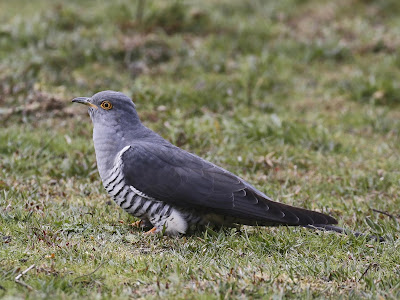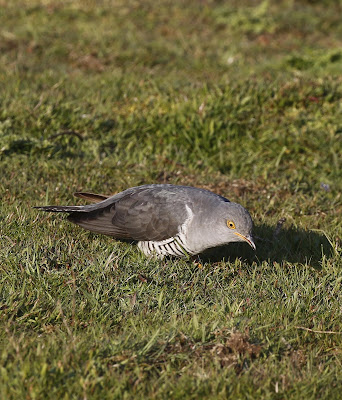I have suffered from anxiety and occasional depression for most of my life and am currently going through a particularly hard time due to a major change in my life and circumstances which has dragged me down into the murky depths of despair. Usually I can adequately cope with the effects and my current heightened anxiety is not serious enough that I find I have reached that situation which I have found myself in before, where I am totally incapacitated and unable to function, but it is enough to make me feel not as I would wish. I try to conceal it from others with sardonic humour where possible and have found another antidote is to keep myself active, every day, even when my favourite interest, birding, seems more like an imposition than a pleasure.
Mark and Adrian, two birding colleagues of mine, had decided they wanted to come and see Colin the Cuckoo and asked my advice. Although having seen Colin just four days previously I decided to join them as their company would be a welcome diversion and for a few hours I knew that my battered spirit would be lifted from its current low ebb.
So it was that, today, I found myself driving south to Surrey and the quite wonderful Thursley Common. The sunny morning and the concentration of driving combined to also provide therapy to the darkness possessing me. I met Mark in The Moat car park at Elstead at noon and we took to the tracks across the common, traversing a boardwalk populated by a number of Common Lizards, one being a remarkable shade of green rather than the more normal brown, sunning themselves on the sun warmed wooden slats of the boardwalk.
Arriving in the field that acts as the stage for Colin's random appearances we joined about ten other people and learned that Colin had not been particularly co-operative so far, having only visited once some hours previously. I stood in the field, my face caressed by the sun and we chatted amongst ourselves as we anticipated the arrival of Colin to gobble up some more mealworms. He was currently perched nearby, high in a tree and for over an hour he sat there, calling cuckoo every so often and attending to his plumage.
Even the Common Redstart and European Stonechat that had been regular visitors on Saturday only put in a couple of appearances each and it was really just a pair of obliging Woodlarks that provided any alternative entertainment as they wandered around the grass looking for stray mealworms that the cuckoo had failed to find.
 |
| European Stonechat-male |
 |
| Woodlarks |
Periodically his faint cuckoos could be heard coming from distant pines as he moved around what was presumably his large territory. Another hour of inactivity on our part passed slowly, very slowly and eventually, slightly bored and feeling tired, I lay on the grass and slipped into a doze on the warm ground. It was not unpleasant and in light sleep I found yet more solace from my troubles.
I was awoken by a fellow birder or photographer announcing that Colin had arrived back in the trees adjacent to the field and the cuckoo confirmed this by uttering a sequence of loud breathy cuckoos.Ten minutes later he at last deigned to pay a visit to the perches and landed in front of us to consume mealworms at the same prodigious rate as he had on Saturday.
A rather tatty Mistle Thrush landed nearby, also attracted by the mealworms, and the similar sized cuckoo eyed it warily but the thrush bounced off in the opposite direction and all was calm once more in Colin's world.
The cuckoo remained at ground level for about twenty minutes, feeding, and then flew back to his large tree where he sank his body low onto his perch to digest his meal. Fifteen minutes later he flew once more, and again it was far out over the common beyond the trees, to call distantly in the sunshine and blue haze of the late afternoon.
It was now 5pm and I needed to set off for home. Normally all the anxiety and depression would flood back into my head but I felt a lightness of spirit as I made my way back to the car park and the worst of my troubles were banished, probably not permanently but enough to allow me a window of peace to regain some equilibrium and mental energy to deal with the inevitable return of my depression.
It will lift eventually. I know this from previous experience. There is always hope and for today Colin and the company of two like minded birding friends have unwittingly helped me to cope.
One day at a time.
A rather tatty Mistle Thrush landed nearby, also attracted by the mealworms, and the similar sized cuckoo eyed it warily but the thrush bounced off in the opposite direction and all was calm once more in Colin's world.
 |
| Mistle Thrush |
It was now 5pm and I needed to set off for home. Normally all the anxiety and depression would flood back into my head but I felt a lightness of spirit as I made my way back to the car park and the worst of my troubles were banished, probably not permanently but enough to allow me a window of peace to regain some equilibrium and mental energy to deal with the inevitable return of my depression.
It will lift eventually. I know this from previous experience. There is always hope and for today Colin and the company of two like minded birding friends have unwittingly helped me to cope.
One day at a time.




















































